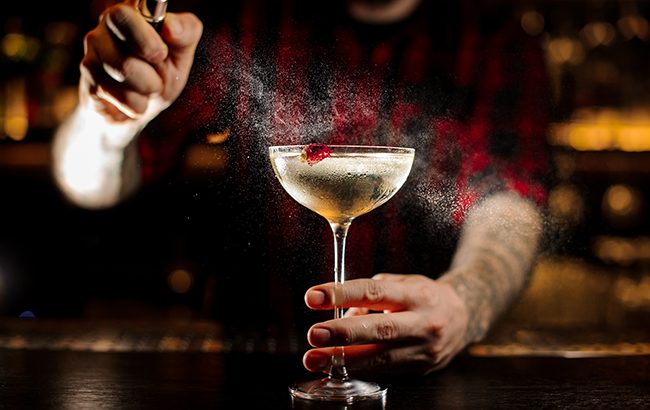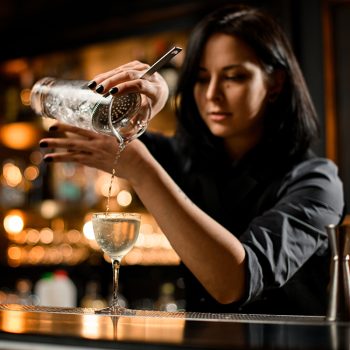News of the world: 2025’s Global Bar Report
By Lauren BowesDespite the blows of tariffs and global financial precarity, the bar industry across the world has been making tentative steps to find firmer footing after a difficult few years.

*This feature was originally published in the November 2025 issue of The Spirits Business magazine.
With Covid firmly in the rearview mirror, 2025 looked set to be the year bars finally roared back to life. Instead, progress has been uneven – but far from stagnant.
It’s not all doom and gloom: the numbers suggest a sector quietly regaining confidence. According to a December 2024 report by Technavio, the global pubs, bars and nightclubs sector is predicted to grow by US$27.7 billion from 2024 to 2028, reflecting a compound annual growth rate of 4.37%.
Behind those steady projections, drinkers are returning to bars with renewed enthusiasm. NIQ’s On-Premise Measurement tool shows people around the world remain as eager as ever to visit their local bars – in some markets, even more so. In the US, 50% of consumers said they had been out for a drink in the previous month, three percentage points higher than NIQ’s last survey. In the UK, on-trade spending has “rebounded strongly”, while in Australia, 51% of respondents reported celebrating a special occasion out in the past three months.
Prices and tariffs
Around the globe, the past few years have been dogged by that displeasingly vague phrase: the ‘cost-of-living crisis’. Those pressures have carried into 2025, joined by a more immediate threat – tariffs. China concluded its anti-dumping investigation with a higher duty on EU brandy imports, while US president Donald Trump’s sweeping tariffs on imports from almost every country have caused widespread uncertainty.
The stop-start nature of the tariffs has left producers and distributors wary, though the impact is being felt most sharply in the US. Analysis from the Wine & Spirits Wholesalers of America found tariffs could raise spirits prices by 80 cents per gallon on average. For categories such as Scotch, that could mean a US$12 increase per bottle once markups and taxes are added.
Those costs have not quite reached the back bar yet, says Jack McGarry, co-founder of The Dead Rabbit, The Irish Exit, and San Patricios: “We haven’t seen a clear price increase yet, as most wine, beer, and liquor companies are absorbing the costs for now. Given the current trends, I’d anticipate a 5%-10% price increase across the board next year.” He has, however, already noticed a rise in food costs.

For GN Chan and Faye Chen, co-founders of Double Chicken Please in New York, the issue goes beyond rising spirits prices. “We approach cocktail creation much like product design – every ingredient, process, and story is intentional,” they say. “When macroeconomic factors like tariffs come into play, especially those affecting imported spirits, we inevitably feel their ripple effects.” They’ve seen fluctuations in pricing over the past few years, even before the latest measures, particularly for European whiskies, Cognacs, and liqueurs. While these increases haven’t been serious, it’s prompted the team to be more strategic to avoid passing costs onto guests, revisiting recipes, and experimenting with alternatives. “In some ways, these challenges have encouraged innovation – pushing us to think more critically about what ‘imported’ versus ‘local’ truly means in a modern cocktail narrative.”
Beyond the US, frustration with tariff policy is pushing drinkers away from American spirits. In Canada, in March, liquor boards pulled US-made products from their portfolios, causing sales of American whiskey to fall by 38% in the 12 weeks to 12 July as consumers turned to local brands instead.
In the UK, Mangrove Global’s Nick Gillett believes consumers and the on-trade are beginning to “vote with their purses. Bartenders, procurement specialists, hospitality professionals – they can be an opinionated bunch, and they pack some punch when they club together,” he said in May. He’s noticed an uptake in other world whiskies, adding: “It does look like it’s in protest of Trump’s policies.”
For bars, this could be an opportunity. If consumers are turning away from big US names, they may be more inclined to explore smaller, locally made brands – and even pay a premium for them.
Nightlife changes
Another challenge facing the on-trade is the changing shape of nightlife. Around the world, bars and nightclubs are finding guests are going out – and heading home – earlier than before. London’s Archive & Myth launched with opening hours until 4am – “but we found out that no one really wanted that”, says head bartender Laurie Howells.
In Hong Kong, cocktail lounge Yume has taken over a nightclub site but opens from 6pm. Its launch announcement captured the shift: “The city that once started its nights at 11pm now prefers to ease into them – with a good drink, a great playlist, and a seat you can actually talk from.”
Plans to revive late-night trading have been met with scepticism. When Montreal officials proposed extending opening hours in late 2024, operators were lukewarm. “Nothing good happens after 1am – and from an operations standpoint, there isn’t that much business coming downtown at those hours,” Andrew Whibley, co-owner of the Cloakroom and Dominion cocktail bars, said at the time. Similar proposals surfaced in the UK last month, with an equally tepid response. “The fact the government is considering extending hours for pubs highlights how out of touch they are with the sector,” says Sacha Lord, former Greater Manchester night-time-economy adviser. “Venues don’t need extra hours – with rising costs, they need a reversal of the national insurance increase, a cut in business rates, and a lowering of VAT. Extending hours is just a desperate headline.”
Of course, this isn’t true everywhere – Argentina, for instance, remains a nation of night owls. Still, the global trend towards earlier socialising has prompted late-night venues to rethink their offering: experimenting with day-to-night concepts, adjusting hours, or adding food and coffee programmes.
For years, Gen Z has been painted as the sober generation – more health-conscious and less interested in alcohol. But new data suggests the reality is more nuanced. A recent IWSR study found 73% of Gen Z respondents had consumed alcohol in the previous six months, up from 66% in March 2023. Their behaviour now looks increasingly similar to that of older generations.
“Moderation has been a growing trend among all drinkers for several years, but the idea that Gen Z LDA+ [legal drinking age] drinkers are somehow fundamentally different from other age groups isn’t supported by the evidence,” explains IWSR’s Richard Halstead. “With every year that passes, more Gen Z drinkers are entering the workforce, and those already in the workforce are typically earning more. As their incomes rise, they’re likely to drink more often – just as Millennials did before them.”
Bars need not fear a generation that shuns alcohol – but moderation is now a cross-generational behaviour. Creating low- and no-ABV options that appeal to all demographics will be key in the coming years.

Behind the bar
The bar world isn’t just shaped by its customers. The past few years have also brought sweeping changes to how the industry operates – and how it looks after its own. This year global community Celebrate Her partnered with Allara Global and CGA by NIQ to create the inaugural Data Census Survey for the Drinks Industry. Nearly four-fifths of global respondents said their perceptions of working in the industry had shifted positively, with two-thirds believing they’ve built lasting futures in the trade.
However, retention, safety, and mental health remain concerns. Concerningly, 57% said stress and burnout have hindered their career progression.
Three in 10 women said they’d been held back by discrimination or bias. “While female representation is increasing, it’s still far behind where it needs to be,” says Lucy Smith, Neurita Tequila’s founder. “This includes female business and brand owners, and the investment going into female alcohol ventures.” As a starting point, she believes on-trade businesses should hire a diverse pool of staff to represent their consumers.
There’s also evidence sexual harassment and abuse remain rife. In last year’s Global Bar Report, we covered a court case facing Australian hospitality group Swillhouse, which was accused of sexual misconduct.
No action has yet been taken, but two of the plaintiffs have responded in their own way. Rachel ‘Rocky’ Hair and Jenna Hemsworth formed Sorry Not Sorry after feeling frustrated with how little had been done once they reported their alleged abuse. The group toured the world this summer, meeting in on-trade venues and creating a safe space for women and gender-diverse people to discuss their experiences. Many attendees swapped stories about repeat offenders at high-profile bars.
Sorry Not Sorry’s work is a reminder that while awareness has grown, lasting change depends on the industry’s willingness to confront its own culture.
The past few years have tested the on-trade in every possible way. But for all the uncertainty, there’s a renewed sense of creativity, conscience and connection driving bars forward. Over the next few days, we’ll dive into the situation by region and profile nine leaders taking the sector forward.
Read our region reports on Europe, North America, South America and Africa and the Middle East.
Related news
Are Indian investors waking up to the power of the on-trade?
